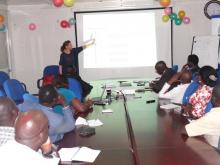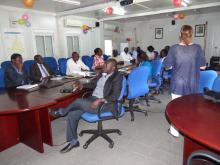WHO leads strengthening of medicines supply chain management system in South Sudan
November 2016 - With the aim to improve access to safe essential medicines, WHO carried out an in-depth assessment and mapping of the country’s procurement and supply management system as well as the mechanisms for medicines procurement and distribution in public and private sectors.
Based on the findings from the assessment, WHO developed a roadmap to streamline the supply chain management of essential medicines including: the development of a strategy to strengthen the supply chain; formation of a new autonomous Medical Supplies Agency (CMS); introducing an efficient data management system which will support the country in the procurement process, improve their ability to eliminate challenges of poor planning, commodity shortages, delays and wastage.
Under the decentralized government structure in South Sudan, development and humanitarian partners use multiple parallel systems to procure and deliver essential health supplies to support health care programmes in the country including the health facilities in conflict affected states. The fragmentation of the supply system and weak capacity of the central medical store brought undesired effects, such as duplication, drug stock-outs, uncoordinated procurement and distribution system, wastages, pilferage and non-rationale use of medicines.
Functional supply chain management system, which enables efficient forecasting, procurement, distribution and rational use of life-saving medicines is a vital component of the health system, says Dr Abdulmumini Usman, the World Health Organization Representative to South Sudan. “WHO is focused on saving lives and ensuring efficient health services delivery system including scaling up the supply chain management of medicines, promoting country ownership, and investing in sustainable country health systems to make real and lasting progress toward achieving universal access to lifesaving medicines” he added.
Strengthening the procurement and supply management system got support from Global fund, Health Pool Fund Partners, World Bank and other donors and partners. WHO will also continue to support the Ministry of Health to lead this process, which will contribute to a more sustainable supply system for the benefit of the people of South Sudan.
_____________________________________
For more information please contact:
Dr Moses Ongom, +211 956 283 515, ongomm [at] who.int (ongomm[at]who[dot]int) Ms Jemila M. Ebrahim, +211 950 450 007, ebrahimj [at] who.int (ebrahimj[at]who[dot]int)





